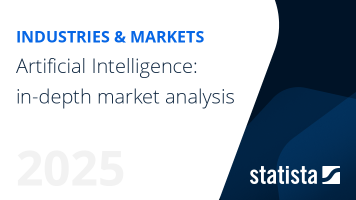Natural Language Processing - Nigeria
Nigeria- The market size in the Natural Language Processing market is projected to reach US$255.43m in 2025.
- The market size is expected to show an annual growth rate (CAGR 2025-2031) of 24.54%, resulting in a market volume of US$953.29m by 2031.
- In global comparison, the largest market size will be United States (US$15.21bn in 2025).
Definition:
Natural language processing (NLP) is a branch of artificial intelligence that focuses on the interaction between human language and computers. Natural language processing tools analyze, understand, and generate written, oral, and visual formats of human language. The Natural Language Processing (NLP) market has relevance for the healthcare, finance, and e-commerce industries in the areas of sentiment analysis, chatbots, and language translation.
Structure:
The Natural Language Processing (NLP) market has three markets. The Text-Based NLP market covers applications that analyze written forms of language. The Speech-Based NLP market covers applications that interpret and understand spoken language. The Language Translation NLP market covers applications that convey the content and meaning of a text from one language into another language.
Additional Information:
The market comprises two key performance indicators: market sizes, and market sizes by industry. Market sizes are generated by the funding amount of Computer Vision companies. Key players of the market include companies such as Amazon Web Services (AWS), Microsoft Azure Cognitive Services, and Google.
For more information on the data displayed, use the info button right next to the boxes.
- Natural language processing tools such as chatbots, virtual assistants, and sentiment analysis that enable machines to understand, interpret, and generate human languages.
- Non-artificial intelligence applications such as spell checking and grammar correction, which do not involve semantic analysis or machine learning.








